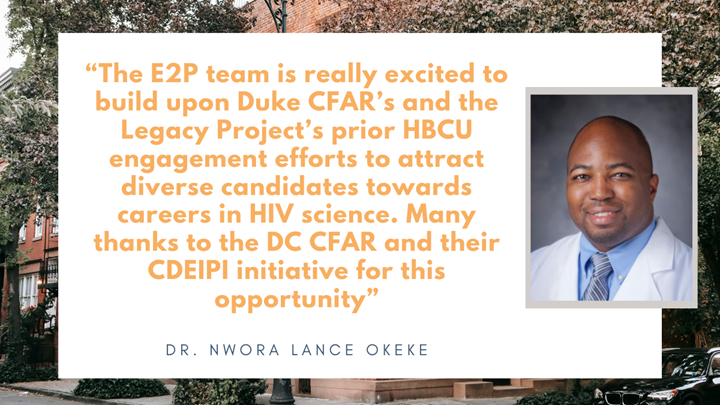The Duke Center for AIDS Research (CFAR) has received an administrative supplement of $150,000 as part of the CFAR Diversity, Equity, and Inclusion Pipeline Initiative (CDEIPI). Duke CFAR’s submission to the program is entitled: “Evidence2Practice (E2P): Leveraging implementation science to recruit HBCU/MSI students into careers in HIV research”

Evidence2Practice (E2P) is an intensive on-campus workshop-based initiative with the goal of increasing
student interest in careers in HIV science, through providing an experience-based introduction to implementation science. The program developed out of a 4-year long collaborative partnership between Dr. Nwora Lance Okeke. MD, MPH (Assistant Professor- Division of Infectious Diseases), Kenric B. Ware, PharmD (Associate Professor of Pharmacy- South University) and Russell Campbell (Deputy Director, Office of HIV/AIDS Network Coordination(HANC)). Through this partnership, Dr. Okeke, Dr. Ware and Mr. Campbell, created the Bringing PrEP to Campus (BPC) program in 2018 aimed at gaining the input of students and administrators at Historically Black Colleges and Universities (HBCU) to create campus-specific strategies for HIV prevention. This program was anchored by the Be the Generation curriculum created by Mr. Campbell and HANC’s Legacy Project. Evidence2Practice is a reconfiguration of the BPC program, created to better respond to CDEIPI’s call to increase HBCU students’ interest in careers in HIV science.
E2P will be led by Dr. Okeke and Dr. Amy Corneli (Associate Professor of Population Health) in partnership with Dr. Ware and Mr. Campbell. E2P’s 3-day interactive workshops will be held at six HBCUs in South Carolina over the course of Spring Semester 2021-22 and Fall Semester 2022-23. The universities participating in the program are: Morris College (Sumter, SC), Voorhees College (Denmark, SC), Claflin University (Orangeburg, SC), South Carolina State University (Orangeburg, SC) and Benedict College (Columbia, SC) and South University (Columbia, SC). Workshops will be based on key concepts of human-centered design and will task participating 8-10 student teams to create a 1-page campus-specific action plan for enhancing knowledge of HIV pre-exposure prophylaxis (PrEP) on their campuses. Preceding student design activities will be a series of introductory lectures on HIV epidemiology, implementation science, human-centered design and current HIV prevention modalities, delivered by Duke CFAR members.
The CDEIPI was developed at the request of the NIH as a component of the broader NIH UNITE initiative (Collins FS, Adams AB, Aklin C et al), affirming NIH’s commitment to addressing structural racism in the biomedical research enterprise. The program is supported through a supplement to the District of Columbia (DC) CFAR and upholds an overarching aim of “increasing the number of Underrepresented Minorities (URM) / Black, Indigenous, and People of Color trainees who are engaged in HIV science at the high school, undergraduate, graduate (masters, doctoral or medical) and post-doctoral levels and to develop pathways for these CFAR Scholars to lead successful careers in science and medicine.”
Says Dr. Okeke, “The E2P team is really excited to build upon Duke CFAR’s and the Legacy Project’s prior HBCU engagement efforts to attract diverse candidates towards careers in HIV science. Many thanks to the DC CFAR and their CDEIPI initiative for this opportunity.”